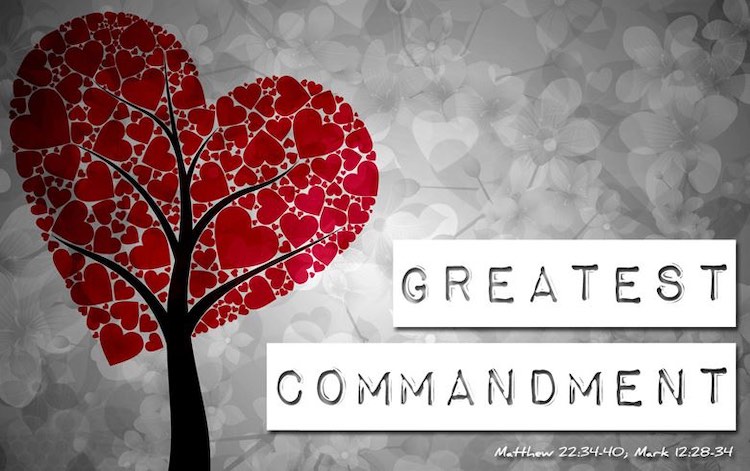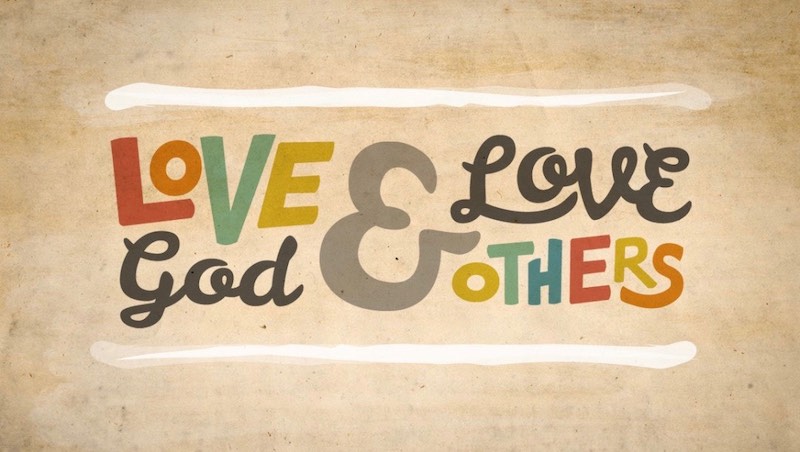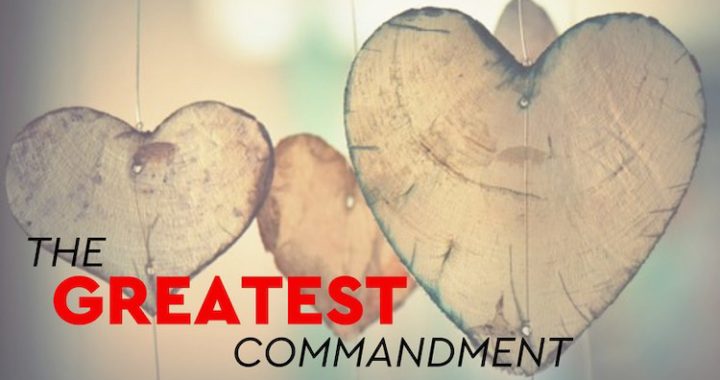The Pharisees and Sadducees were continually looking for a way to trap Yeshua in His words. One day they asked Yeshua a series questions ranging from paying taxes to Caesar to the validity of the resurrection. They posed as students desiring to learn from the great Rabbi, but it was all a show as their real intention was to catch Him in a violation of the Law of Moses. One final question would get to the heart of the matter and Yeshua’s response would leave them speechless:
But when the Pharisees heard that Yeshua had silenced the Sadducees, they gathered themselves together. One of them, a lawyer, asked Him a question, testing Him, “Teacher, which is the great commandment in the Law? – Matt. 22:34-36
Assuming that Yeshua did not follow the Law as strictly as they did, they surely thought that they had Him in a corner from which He could not escape. In their minds, Yeshua could not possibly properly identify the greatest commandment.
According to the rabbis, there are 613 commandments in the Law which are to be kept by the people of Israel. The Law is filled with various commands pertaining to men, women, priests, prophets, foreigners, and even animals. Every letter of every word of the Torah is considered significant. We see an example of this in this week’s Torah Portion reading.

Tzav – צו – Command
The name of this week’s Torah Portion is צו – Tzav, which is a verb meaning to command, charge, or appoint. In this context it seems best to use the word command. We see how this word is used in the first two verses of this week’s reading:
Then the LORD spoke to Moses, saying, “Command Aaron and his sons, saying, ‘This is the law for the burnt offering: the burnt offering itself shall remain on the hearth on the altar all night until the morning, and the fire on the altar is to be kept burning on it.’” – Lev. 6:8-9
It was the instruction of the LORD to Moses to “command” Aaron and his sons regarding the regulations for the burnt offering.
If the word Tzav – command was used regularly in this fashion than it would seem normal that God was telling Moses to “Command Aaron and his sons,…” however, this is the only time in all of the Bible where this word is used in such a direct manner to instruct the priests. In this same chapter, we see how God usually instructed Moses to communicate to the priests by speaking to them: “Then the LORD spoke to Moses, saying, “Speak to Aaron and to his sons, saying,…” (Lev. 6:24-25) So why did the LORD tell Moses to “command Aaron and his sons” regarding the burnt offering instead of simply telling him to “speak to Aaron and his sons”? What is so unique about the burnt offering that would cause God to emphasize to Moses to “command” Aaron and his sons in fulfilling this sacrifice?
The Uniqueness of the Burnt Offering
The reason for the use of the word Tsav – command in this particular context of the burnt offering seems to be directly related to the offering itself. The burnt offering was different from the other sacrifices and offerings that the priests were to offer on the altar. All of the other sacrifices came with the added benefit of the priests being able to partake of the offerings, however, the burnt offering was not to be eaten by the priests. As its very name implies, the burnt offering was to be totally consumed on the altar becoming a complete sacrifice to the LORD.
Since the burnt offering was totally set apart to the LORD and consumed on the altar by fire, the understanding is that the priests may have been less motivated to offer the burnt offering. There was no direct physical benefit to the priests for offering the burnt offering. Therefore, instead of having Moses simply speak to the priests about how to fulfill the commandment of the burnt offering on the altar, the LORD told Moses to command the priests with regard to the instructions for the burnt offering to ensure that it was carried out properly as the LORD Himself demanded. Even though the priests would not be able to eat the burnt offering, it was still to be performed exactly as the LORD commanded.
All of the sacrifices which are commanded in the Law needed to be performed in the manner by which God had instructed the people and the priests, however, the burnt offering was unique in a couple of different ways. As already mentioned, the burnt offering was the one sacrifice of which the priests could not partake. We also read in the Law how the burnt offering was offered up twice daily as the continual sacrifice to the LORD (Ex. 29:38-39). It was the continual burnt offering of a lamb every morning and evening which provided the sacrificial atonement enabling God to dwell in the midst of His people:
It shall be a continual burnt offering throughout your generations at the doorway of the tent of meeting before the LORD, where I will meet with you, to speak to you there. I will meet there with the sons of Israel, and it shall be consecrated by My glory. – Ex. 29:42-43
The burnt offering was the foundation of relationship with God for the people of Israel.
It was only through the means of the continual burnt offering being performed twice daily on the altar that God could meet and communicate with His people. The primacy of the burnt offering among the sacrifices demanded that the priests be commanded (Tzav) by Moses regarding how to carry out the commandment of this unique sacrifice. Since the burnt offering was distinctly set apart from the other sacrifices and the priests were specifically commanded regarding the law of the burnt offering, it would seem that this command would be the foremost of all of the commandments.
Eating of the Burnt Offering
The LORD clearly commanded the priests in Leviticus chapter six that the burnt offering was to be totally consumed on the altar and that none of it was to be eaten, however, we read the exact opposite instruction from the LORD in the book of Jeremiah: “Thus says the LORD of hosts, the God of Israel, ‘Add your burnt offerings to your sacrifices and eat flesh.’” (Jer. 7:21) It almost seems like the LORD is contradicting His own command to the priests in Leviticus chapter six. Why would the LORD command that the burnt offering be eaten in Jeremiah’s time when it was forbidden to be eaten at the giving of the Law?
In Jeremiah chapter seven, the LORD was rebuking the people of Judah for their having strayed from Him in order to serve and worship foreign gods. As a way to illustrate the waywardness of the Israelites the LORD commanded the people to eat the meat of the burnt offerings together with their other sacrifices. It is possible that the people were already committing this grievous sin.
Defilement of the Burnt Offering
When the LORD told the Israelites to eat the forbidden meat of the burnt offering, He was exposing their sin. The other possibility is that the LORD was revealing to the people how abhorrent their sin had become to Him by saying something like the following: “Since you are already worshiping other gods and breaking My holy Law you should just completely forsake My Law and eat the burnt offering, which is forbidden.” We know that the LORD said something similar a few verses earlier in Jeremiah chapter seven:
“Behold, you are trusting in deceptive words to no avail. Will you steal, murder, and commit adultery and swear falsely, and offer sacrifices to Baal and walk after other gods that you have not known, then come and stand before Me in this house, which is called by My name, and say, ‘We are delivered!’—that you may do all these abominations? Has this house, which is called by My name, become a den of robbers in your sight? Behold, I, even I, have seen it,” declares the LORD. – Jer. 7:8-11
The sins of the people had so offended the LORD and they had so confused their worship of the One True God, that the sanctity of the burnt offering had become meaningless.
The Law of God given to Moses for the Israelites was meant to provide a holy code of conduct that would set the Israelites apart from the nations. The sacrificial system was given to the people and the priests to maintain right relationship with God. The priests alone were to execute all of the offerings and they were specifically instructed regarding the burnt offering as Moses command them. The burnt offering, which was the basis of a continual relationship with God and His dwelling among the people, had simply become a piece of meat to be grilled and eaten.
Something Greater Than Sacrifice
Although the LORD had given the Tabernacle and the sacrificial system as a means of worship and atonement it was never meant to be the central focus. In Jeremiah chapter seven we continue to read the words of the LORD as He explained His true desire for His people:
For I did not speak to your fathers, or command them in the day that I brought them out of the land of Egypt, concerning burnt offerings and sacrifices. But this is what I commanded them, saying, ‘Obey My voice, and I will be your God, and you will be My people; and you will walk in all the way which I command you, that it may be well with you.’ Yet they did not obey or incline their ear, but walked in their own counsels and in the stubbornness of their evil heart, and went backward and not forward. – Jer. 7:22-24
The most important thing that the LORD wanted from His people was not sacrifice and offerings, including the burnt offering, but rather a people who would listen to His voice and walk in His ways.
The sacrificial system was implemented because the people needed atonement from sin. God’s greatest desire, however, was for His people to know Him, hear His voice, and listen to Him:
‘…Now then, if you will indeed obey My voice and keep My covenant, then you shall be My own possession among all the peoples, for all the earth is Mine; and you shall be to Me a kingdom of priests and a holy nation.’ These are the words that you shall speak to the sons of Israel. – Ex. 19:5-6
These are the words which the LORD spoke to the children of Israel after they had come out of Egypt. This is the heart of God for His people.

Living Out The Greatest Commandment
Therefore, when Yeshua was asked the question regarding the greatest commandment found in the Law, Yeshua did not focus on the commandment relating to the burnt offering or any other sacrifice, but rather a devoted love relationship with God Himself:
One of the scribes came and heard them arguing, and recognizing that He had answered them well, asked Him, “What commandment is the foremost of all?” Jesus answered, “The foremost is, ‘Hear, O Israel! The LORD our God is one LORD; and you shall love the LORD your God with all your heart, and with all your soul, and with all your mind, and with all your strength.’ The second is this, ‘You shall love your neighbor as yourself.’ There is no other commandment greater than these.” The scribe said to Him, “Right, Teacher; You have truly stated that He is One, and there is no one else besides Him; and to love Him with all the heart and with all the understanding and with all the strength, and to love one’s neighbor as himself, is much more than all burnt offerings and sacrifices.” When Jesus saw that he had answered intelligently, He said to him, “You are not far from the kingdom of God.” After that, no one would venture to ask Him any more questions. – Mark 12:28-34
To believe in the God of Abraham, Isaac, and Jacob, love Him with all of one’s being, and to love one’s neighbor as oneself expresses the entirety of the Law.
The person who asked this question to Yeshua admitted that loving God and loving one’s neighbor is indeed the foremost commandment and is even greater than the unique commandment of the continual burnt offering. In all of the four gospels of the New Testament, the burnt offering is only mentioned once, in the verses quoted above in the gospel of Mark. The commandment which seemingly held the greatest honor in the Law, that of the burnt offering, pales in comparison to the greatest commandment, to love the LORD with all of your being and to love your neighbor as yourself.
Shabbat Shalom!
If you enjoyed reading this article, share it today with friends! We also invite you to sign up for our weekly Torah Portion commentary on the sidebar to the right.
Help keep our weekly commentaries free and available to all. Click here to donate today:

Torah Portion: Lev. 6:8 – Lev. 8:36
Haftara: Jer. 7:21 – Jer. 8:3, 9:23-24
Return to Torah Portion Homepage
Copyright Jewels of Judaism. All rights reserved 2019


Thank you Daniel for sharing the words of the Lord! The love of the Lord and all human beings, is foremost! Shabbat Shalom! Kristina